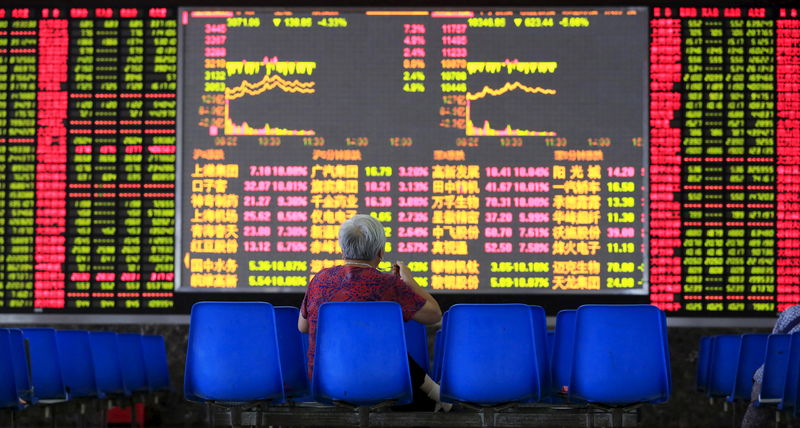By Hideyuki Sano
TOKYO (Reuters) - Global bond yields flirted with record lows while stocks inched down on Thursday, as global recession worries from intensifying U.S.-China frictions and the spectre of a no-deal Brexit drove investors to safer harbours.
MSCI's broadest index of Asia-Pacific shares outside Japan (MIAPJ0000PUS) fell 0.15%, Singapore shares (STI) hit eight-month lows, while Japan's Nikkei (N225) shed 0.07%.
On Wall Street, the S&P 500 (SPX) gained 0.65% on Wednesday due in part to gains in the energy sector following a rebound in oil prices. But U.S. stock futures lost 0.2% in Asia.
European shares are expected to slip again, with pan-European Euro Stoxx 50 futures (STXEc1) down 0.21%.
Bond markets around the world painted a gloomier picture, with yields on 30-year U.S. Treasuries and 10-year German bunds yield both hitting record lows - 1.905 percent (US30YT=RR) and minus 0.716 percent on Wednesday.
Inversion remains a prominent feature across the U.S. yield curve, where long-dated yields are below short-dated ones - an unsettling sign as yield curve inversions have been a reliable leading indicator of future U.S. recessions.
Italy's 10-year bond yield briefly fell below 1% for the first time ever, in part prompted by growing hopes that a new government will soon be formed in Rome and a new election averted.
The 10-year Japanese government bond yield dipped 1 basis point to minus 0.285%, just above its record low of minus 0.300% touched in 2016.
"Falls in global bond yields reflect growing concerns that long-term global growth is slowing down on U.S.-China tensions and worries over subsequent global supply chain disruptions," said Tomoo Kinoshita, global market strategist at Invesco Asset Management in Tokyo.
"Stock markets on the other hand are supported in the near-term by hopes of more stimulus, notably from the Federal Reserve and the European Central Bank," he said.
The two major central banks are expected to cut rates next month, while many investors believe the Bank of Japan could join the fray if market sentiment weakens further.
The Trump administration on Wednesday made official its extra 5% tariff on $300 billion in Chinese imports and set collection dates of Sept. 1 and Dec. 15.
That means products such as smartwatches, Bluetooth headphones, flat panel televisions and many types of footwear will be levied from next month, raising worries about U.S. consumption, one of the few remaining bright spots in the world economy.
The precious metal markets highlighted investors' quest to buy safer assets.
Gold rose 0.3% to $1,543.7 per ounce, near six-year highs of $1,556.1 set earlier in the week while silver extended its bull run and rose 0.85% to fetch $18.32 per ounce, edging near its 2017 peak.
Sharp falls in bond yields, however, have some investors worried that the recent rally in bond prices may have gone too far.
The 30-year U.S. bond yield, now at 1.921%, has fallen 60 basis points so far this month, slipping below the dividend yield of U.S. shares, which stood just above two percent.
"Yields may have fallen to unjustifiable levels even if one bets on a long-term stagnation in the global economy. And when we had a major bond correction in Europe four years ago, the adjustment was quite sharp," said Yoshinori Shigemi, global market strategist at JPMorgan (NYSE:JPM) Asset Management in Tokyo.
Reflecting some nervousness, Merrill Lynch move index (MERMOVE3M), a gauge of investors' expectations on how volatile U.S. bonds will be, has risen back near three-year highs marked earlier this month.
In the currency market, the yen gained 0.2% to 105.90 per dollar while the New Zealand dollar slipped 0.4% to four-year lows on grim domestic business sentiment data.
The euro was steady at $1.1084 (EUR=).
The MSCI emerging market currency index (MIEM00000CUS) is at its lowest levels since mid-November, having fallen 0.9% so far this week and on course to mark its biggest monthly fall in more than seven years, driven by worries about a global slowdown.
The Brazilian real has fallen 8.5% while the Mexican peso has lost 5.7% so far this month.
The British pound licked its wounds at $1.2200 , as the most serious UK political crisis in decades deepened after Prime Minister Boris Johnson decided to suspend Britain's parliament for more than a month before Brexit.
The move will limit the time opponents have to derail a disorderly Brexit but also increases the chance that Johnson could face a vote of no-confidence in his government, and possibly an election.
"From an economic point of view, actively pursuing a no-deal Brexit through suspending parliament is tantamount to actively pursuing a recession," said Seema Shah, Chief Strategist, Principal Global Investors in London.
Concerns about Brexit are already taking a toll on Europe, with the recent export slump in Germany driven mainly by weaker sales to Britain rather than the broader trade war.
Oil prices slipped a tad after a gain of nearly 2% in the previous session.

Brent crude (LCOc1) futures fell 0.53% to $60.17 a barrel while U.S. West Texas Intermediate (WTI) crude (CLc1) lost 0.36% to $55.58 per barrel.